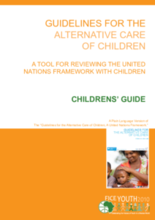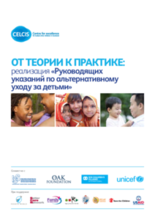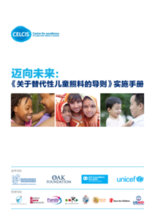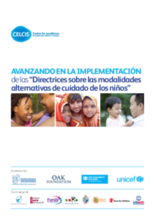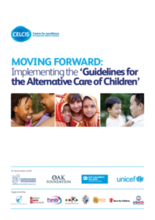Displaying 12771 - 12780 of 14580
This booklet from SOS Children’s Villages International was created for young people to explain in a simple manner the main points of the Guidelines for the Alternative Care of Children approved by the United Nations General Assembly in 2009. The booklet helps its young audience think about the principles of alternative care and what these mean for children and families in different situations.
Dans un contexte en évolution, Terre des hommes ne servira plus d’intermédiaire en adoption mais continuera de plaider pour la protection de l’enfant, en favorisant le maintien ou le retour des enfants dans leur famille ou le recours à des prises en charge alternatives comme les familles d’accueil dans les pays d’origine des enfants.
This handbook (in Russian) is designed as a tool for legislators, policy-makers, and all professionals and care providers to support the implementation of the Guidelines for the Alternative Care of Children, endorsed by the United Nations General Assembly in 2009.
This handbook (in Mandarin) is designed as a tool for legislators, policy-makers, and all professionals and care providers to support the implementation of the Guidelines for the Alternative Care of Children, endorsed by the United Nations General Assembly in 2009.
This handbook (in German) is designed as a tool for legislators, policy-makers, and all professionals and care providers to support the implementation of the Guidelines for the Alternative Care of Children, endorsed by the United Nations General Assembly in 2009.
Este manual está diseñado como una herramienta para legisladores, responsables de políticas públicas, y todos los profesionales y provedores de cuidados para apoyar la implementación de las Directrices para el Cuidado Alternativo de la Infancia, avalada por la Asamblea General de las Naciones Unidas en 2009.
Ce manuel est conçu comme un outil pour les législateurs, les décideurs politiques, et tous les professionnels afin de soutenir la mise en œuvre des lignes directrices pour la prise en charge alternative des enfants, approuvées par l'Assemblée générale des Nations Unies en 2009
This handbook, Moving Forward: Implementation of the ‘Guidelines for the Alternative Care of Children,’ is aimed at legislators, policy-makers and decision-makers, as well as professionals and care providers, to support the implementation of the Guidelines for the Alternative Care of Children, endorsed by the United Nations General Assembly in 2009. It explains the key thrusts of the Guidelines, outlines the kind of policy responses required, and describes ‘promising’ examples of efforts already made to apply them in diverse communities, countries, regions and cultures.
The handbook of the United Nations approved Guidelines for the Alternative Care of Children is to be launched on March 7th, 2013 3:00-4:30pm at Room XXII, Human Rights Council, Palais des Nations, Geneva. The handbook provides practical guidance on moving forward on the road to alternative care provision for children. It highlights implications for policy-making where national governments should provide leadership as well as provides links to what is already being effectively done on the ground.
This paper is a culmination of various studies carried out by the authors and other researchers and seeks to specifically interrogate factors in the family system in Kenya, which contributes to children leaving homes to live on the streets.

